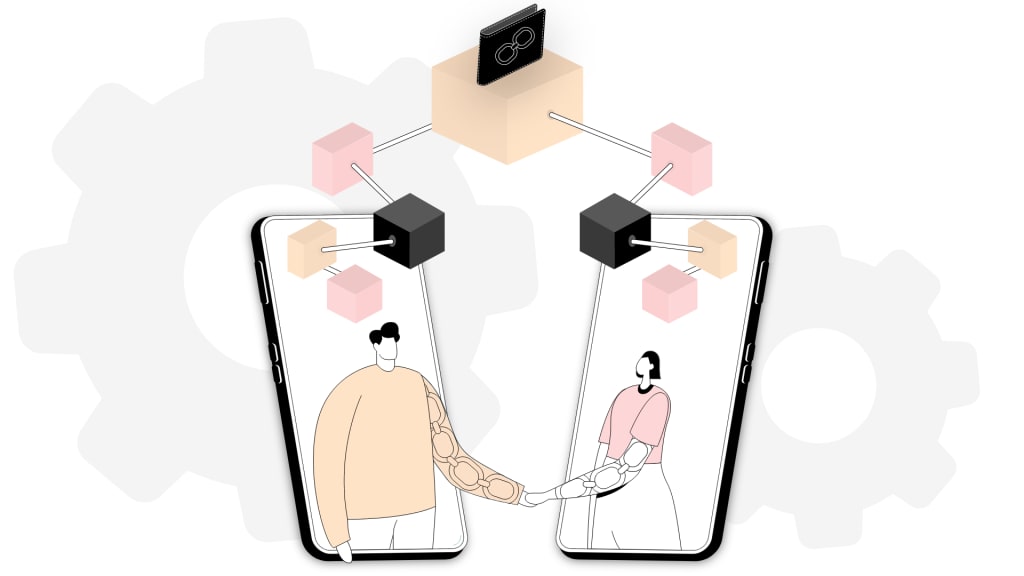How to Build a Blockchain App
How to build a blockchain app in 2021 and what benefits businesses can get from it you can find in this article

Though the hype around cryptocurrency has subsided, the interest in blockchain remains the same.
Blockchain market size is projected to grow from 2.01 billion in 2019 to 69.04 billion in 2027, showing a CAGR of over 56%.
Blockchain is a digital ledger of transactions with copies distributed across the entire network of computers connected to the blockchain. Each block in the chain contents a number of transactions. Every time a new transaction is added, a record of information about that transaction is added to every participant’s blockchain.
Blockchain is an innovative system of recording information in a way that makes it difficult to impossible to hack or compromise the system.
4 KEY TYPES OF BLOCKCHAIN
When it comes to blockchain, there 4 two types of networks that you can utilize for your project:
- Permissionless blockchain (public) – accessible to all members of the networks and on any device. Any user can become a part of the blockchain, make transactions, verify them and stay anonymous. The main example of permissionless blockchain is Bitcoin. This type of blockchain is great if you want to create an app that will be available for a wide audience.
- Permissioned blockchain (private) – accessible to authorized participants only. This type of blockchain has certain rules that regulate transactions between network participants (nodes). Permissioned blockchain is mostly used by organizations for internal purposes with all the transactions validators belonging to the same company.
- Hybrid blockchain – in some cases, organizations will benefit by taking the best from the two worlds. Hybrid blockchain allows to create a private system alongside a public system. This way, they can control who can access specific data stored in the blockchain and what data is open to all network participants.
- Consortium blockchain – this type of blockchain is also known as a federated blockchain. It is similar to the previous type as it’s a private blockchain with limited access to a particular group. Consortium blockchain has a validator node that can initiate, receive and validate transactions. Member nodes can only receive and initiate transactions, but they cannot validate them.
THE INDUSTRY FOR DAPP DEVELOPMENT
According to State of the dApps, there are over 3,5459 active decentralized applications. Such apps are distributed through different industries, such as gaming, finance, health, security, and so on.
Let’s review some of the industries that blockchain is disrupting and get some inspiration for your future project.
The technology can be used for all key services provided by banks, such as payments, clearance and settlement systems. One day, blockchain promises to put crime and fraud to rest in the financial industry. The benefits of implementing a decentralized ledger include:
- Real-time and multi-party tracking and management of bank guarantees
- Faster and more accurate automated reporting that draws information from immutable records
- Faster transfer of funds between financial institutions with accelerated settlement
Numerous companies in the finance industry are already using blockchain in their daily operations. Examples include Credit Suisse, which uses blockchain to settle US stock trades. JPMorgan Chase uses decentralized technology to facilitate transactions between institutional accounts. Ripple and R3 are among the most popular blockchains used in this industry.
Implementations: Credit Suisse, JP Morgan Chase, Western Union, Santander
- Insurance
- Healthcare
- Real estate
- Retail
- Supply chain
- Copyright & intellectual property
- Internet of things (iot)
- Internet identity and dns
TOP-7 MOST POPULAR BLOCKCHAIN DEVELOPMENT PLATFORMS
If you are wondering how to build a blockchain app, you first need to learn about the most popular blockchain platforms. There are quite a few solutions that you can use as the basis for your application.
- Ethereum – one of the most popular open-source blockchain platforms that gained popularity thanks to flexibility. Ethereum can be used for creating decentralized apps (dApps), smart contracts, and ICOs. Building Ethereum is only possible with its own programming language Solidify, but thanks to HTTP API, it’s possible to create dApps in any programming language.
- Hyperledger Fabric – this blockchain platform is especially popular among companies dealing with supply chain management and connected devices. This is an advanced platform for permissioned networks, thus requiring the user’s authorization. If you choose this platform, you will need to hire Go, Java, and JavaScript developers for the task.
- EOS – the platform is designed for building dApps that rely on the use of smart contracts. The solution offers decentralized application hosting, decentralized storage of enterprise solutions, and smart contracts capability.
- R3 Corda – the platform is mostly used for creating permissioned blockchain and can be easily integrated with an already existing system. The main spheres of use are eCommerce, healthcare, supply chain and trade finance.
- OpenChain – an open-source distributed ledger platform that uses a single authority for transaction validation. The platform is mostly used by companies to securely manage digital assets. There is no transaction fee and only one administrator needed for their validation.
- NEO – a platform is designed for decentralized solutions that require high performance and scalability. NEO uses NEO token for paying transaction fees and uses Delegated Byzantine Fault Tolerance since it offers the higher performance needed for high-load dApps.
- Ripple – a blockchain platform designed for financial services. Ripple connects payment providers, digital assets exchanges, banks and corporations with their blockchain network RippleNet. Ripple allows building fast and scalable solutions, which is ideal for the financial industry.
BLOCKCHAIN APPLICATION DEVELOPMENT
In most companies, the software development process is divided into two major stages.
DISCOVERY STAGE
Discovery stage (also known as the pre-development stage) – during this stage, the blockchain development vendor will identify your needs and business requirements. The main goal of this stage is to create an overall understanding of your project and all requirements that you have.
The discovery stage offers a number of benefits, such as:
- Time and money saving
- Business and technical requirements validation
- Documentation of project functionality
- Evaluation of potential risks and their addressing
- Tasks prioritization and allocation of a development team
- Full understanding of the client’s needs
Key deliverables of the Discovery stage include:
- Finalized project concept
- Product backlog
- UX/UI design
- Project architecture plan
- Market and competitor analysis (optional)
DEVELOPMENT STAGE
During this stage, the code base of an application is created. Development usually involved the work of different experts, such as front-end and back-end developers, QA engineers, Software Architects, and Project Managers.
In most cases, you start small with the simplest version of your app. This way, you can safely test your app idea without heavily investing in the development process. The main goal of MVP (Minimum Viable Product) development is to reduce risks, especially if you are working with blockchain and some unique features that no one has built before.
After you’ve successfully tested your idea, you can move to full product development.
HOW MUCH DOES IT COST TO BUILD A BLOCKCHAIN APP?
Usually, blockchain app development cost starts at around $20,00-$60,000 and can reach up to $200,000 and even go beyond this number. Usually, if you work with US blockchain app developers, hourly development prices start at $100 and can reach $250 in some cases. Off-shore app development outsourcing makes sense if you want to get the best talent on the market at affordable prices.
Companies from Europe and Asia are of great interest to startups and companies from all around the world, as you can get the same quality services for twice as low prices as compared to the US market.
Read more about How to Build a Blockchain App.
About the Creator
Anahit Ghazaryan
I am a Software Development and SEO Consultant at Addevice, a software development company, which specializes in mobile and web app development, UI/UX, and consulting.






Comments
There are no comments for this story
Be the first to respond and start the conversation.